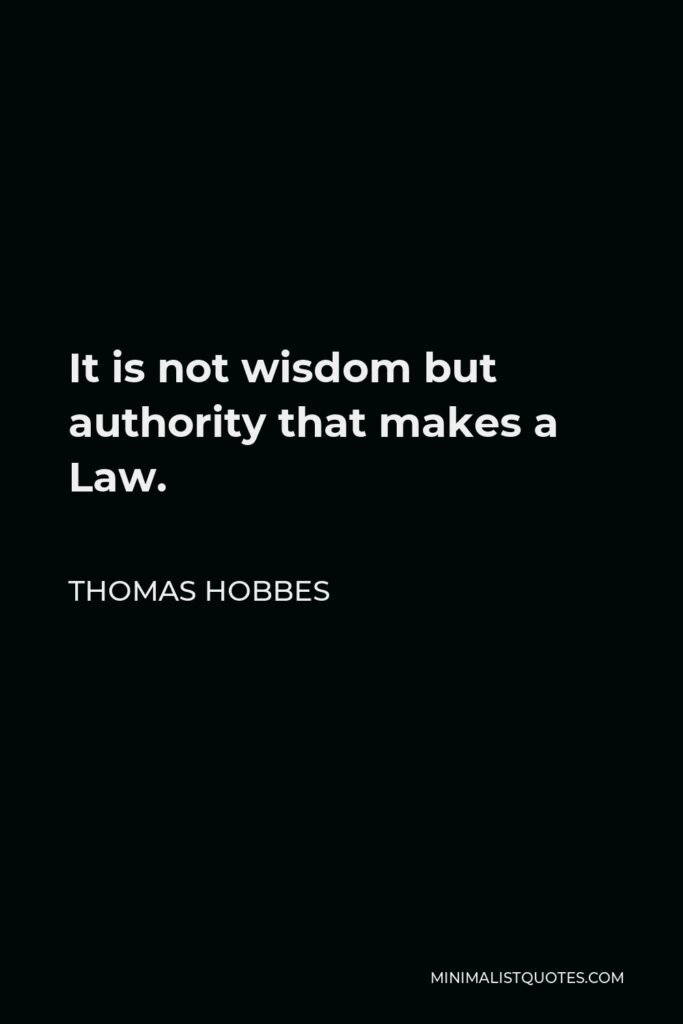If the wise, rather than just those who have managed to rise to positions of control, made the rules, how would the world look? Compassion follows wisdom, and rules follow authority. Reason follows experience, and authority follows directives.
Introduction
The quote “It is not wisdom but authority that makes a law” is attributed to the English philosopher Thomas Hobbes. In his book Leviathan, Hobbes argues that laws are not made by wise men, but by those who have authority. He believes that authority is necessary to ensure that laws are obeyed, and that wisdom is not enough to make a law effective.
Definition of Wisdom
Wisdom can be defined as the ability to apply knowledge, experience, and good judgment to make sound decisions and navigate complex situations. It goes beyond mere intelligence or information, encompassing a deeper understanding of human nature, ethics, and the consequences of actions. Wisdom is often associated with virtues such as empathy, compassion, and humility.
Understanding Wisdom
Wisdom as a Philosophical Concept
Wisdom has been a subject of philosophical inquiry for centuries, with various interpretations and perspectives. Philosophers often view wisdom as a virtue that goes beyond mere knowledge and intellectual abilities. It encompasses a deep understanding of fundamental truths, ethical principles, and the complexities of human existence. Wisdom involves discernment, reflection, and the integration of knowledge into practical wisdom for the benefit of oneself and others.
Wisdom as a Source of Guidance
Wisdom serves as a source of guidance, providing insights and principles to navigate life’s challenges. It draws from accumulated knowledge, experiences, and introspection. Wise individuals possess a broad perspective, considering the long-term consequences and the interconnectedness of actions. They can weigh different options, anticipate outcomes, and make decisions that align with ethical principles and the greater good.
The Role of Wisdom in Decision-Making
Wisdom plays a crucial role in decision-making, especially in complex and uncertain situations. It involves analyzing information, considering diverse viewpoints, and reflecting on the potential impacts of choices. Wise decision-making incorporates moral values, empathy, and a deep understanding of human nature. It aims to balance immediate needs with long-term considerations, fostering fairness, justice, and sustainable outcomes.
The role of wisdom in lawmaking
While authority is important in lawmaking, wisdom is also essential. Laws should be made in accordance with the principles of justice and fairness. They should also be based on a sound understanding of human nature and society. Wisdom can help to ensure that laws are effective and that they serve the common good.
Definition of Authority
Authority refers to the power or right to give commands, enforce obedience, and make decisions. It is derived from a position of legitimate power, which can be vested in individuals, institutions, or governing bodies. Authority is often backed by laws, regulations, or social norms that grant the ability to enforce and maintain order within a society.
The importance of authority in lawmaking
There are several reasons why authority is important in lawmaking. First, authority gives laws legitimacy. When people believe that laws are made by those who have authority, they are more likely to obey them. Second, authority helps to ensure that laws are consistent and fair. When laws are made by a single authority, they are more likely to be consistent with each other and with the values of the society. Third, authority helps to prevent conflict. When people know that there is a central authority that can make and enforce laws, they are less likely to take the law into their own hands.
The Power of Authority
Defining Authority in the Context of Law
In the context of law, authority refers to the legitimate power and control vested in individuals or institutions to make decisions, enforce rules, and maintain order. It is derived from legal frameworks, such as constitutions, statutes, or delegated powers, that grant the authority the ability to exercise control over certain aspects of society. Legal authorities include government bodies, legislative bodies, executive officials, judges, and law enforcement agencies.
The Relationship Between Authority and Power
Authority and power are closely related concepts, but they are not synonymous. Power refers to the ability to influence or control others, while authority is the legitimacy or right to exercise that power. Authority provides the foundation for power by establishing the framework within which power is exercised. Legitimate authority is generally derived from the consent or recognition of those being governed, which distinguishes it from mere coercion or force.
The Influence of Authority on Law-Making
Authority plays a crucial role in the process of law-making. Legislative bodies, such as parliaments or congresses, possess the authority to draft and pass laws. They represent the will of the people and exercise the authority granted to them by the constitution or other legal frameworks. The authority of these bodies derives from their democratic legitimacy and the consent of the governed.
The Nature of Law
Defining Law and Its Purpose
Law can be defined as a system of rules and regulations that govern human behavior within a society. It is a mechanism through which societies establish order, resolve conflicts, protect individual rights, and promote social justice. The primary purpose of law is to provide a framework for regulating behavior, maintaining stability, and promoting the common good.
Laws serve multiple functions, including:
- Establishing standards of conduct: Laws set guidelines for acceptable behavior and define what actions are permissible or prohibited within a society.
- Resolving disputes: Laws provide a structured framework for resolving conflicts and seeking justice when disputes arise.
- Protecting individual rights: Laws safeguard the rights and freedoms of individuals, ensuring their protection from harm, discrimination, and infringement.
- Promoting social order: Laws help maintain social order by providing a sense of predictability and stability within a society, facilitating cooperation and peaceful coexistence.
The Various Sources of Law
The sources of law can vary depending on the legal system of a particular country. Common sources of law include:
- Legislation: Laws created through the legislative process, where elected representatives draft, debate, and pass statutes. Legislation includes acts, statutes, codes, and regulations enacted by national, regional, or local legislative bodies.
- Constitutional Law: The fundamental law of a country or region that establishes the framework of government, outlines the powers and limitations of government institutions, and protects individual rights. Constitutional law serves as the supreme law of the land and guides the interpretation and application of other laws.
- Case Law or Common Law: Laws developed through judicial decisions in courts. Case law refers to legal principles established through precedents set by previous court decisions. It provides guidance and interpretation for legal disputes that fall within the scope of previous rulings.
- International Law: Legal principles and agreements that govern relations between nations and international organizations. International law includes treaties, conventions, and customary practices accepted by the international community.
- Customary Law: Unwritten rules and practices that develop over time within a particular community or culture. Customary law derives its authority from long-standing traditions and is recognized and respected by the community.
The Role of Authority in Enforcing and Implementing Laws
Authority plays a crucial role in the enforcement and implementation of laws. Law enforcement agencies, operating under the authority of the executive branch, are responsible for upholding the law, investigating potential violations, and ensuring compliance. They have the power to detain individuals, conduct investigations, and take legal action against those who violate the law.
Wisdom versus Authority: Examining the Dichotomy
Wisdom as an Alternative to Authority
Some argue that wisdom should take precedence over authority in law-making. They advocate for the inclusion of wise individuals, such as legal scholars, philosophers, and experienced practitioners, in decision-making processes. Wisdom brings valuable insights, ethical considerations, and a long-term perspective to the table. It emphasizes the importance of fairness, justice, and the well-being of individuals and communities in the creation of laws.
The Limitations of Wisdom in Law-Making
While wisdom brings valuable insights, it also has limitations in the context of law-making. Wisdom is subjective and varies among individuals, making it challenging to establish a universally agreed-upon framework. Different perspectives and interpretations of wisdom can lead to disagreements and impede the decision-making process.
The Role of Authority in Complementing Wisdom
While wisdom provides valuable insights, authority plays a complementary role in the law-making process. Authority brings the power, structure, and legitimacy necessary to establish, enforce, and implement laws. It provides a framework that ensures the practicality, enforceability, and consistency of laws within a legal system.
The Connection between Wisdom, Authority, and Law
Wisdom and authority are interconnected in the context of law. While wisdom represents the knowledge and discernment necessary for making just and equitable decisions, authority provides the means to establish and enforce those decisions as laws. The relationship between wisdom, authority, and law is symbiotic, as wisdom informs the creation of laws, while authority ensures their implementation and adherence.
Conclusion
The quote “It is not wisdom but authority that makes a law” highlights the importance of authority in lawmaking. However, it also suggests that wisdom is an essential ingredient in good lawmaking. When authority and wisdom are combined, the result is laws that are both legitimate and effective.







